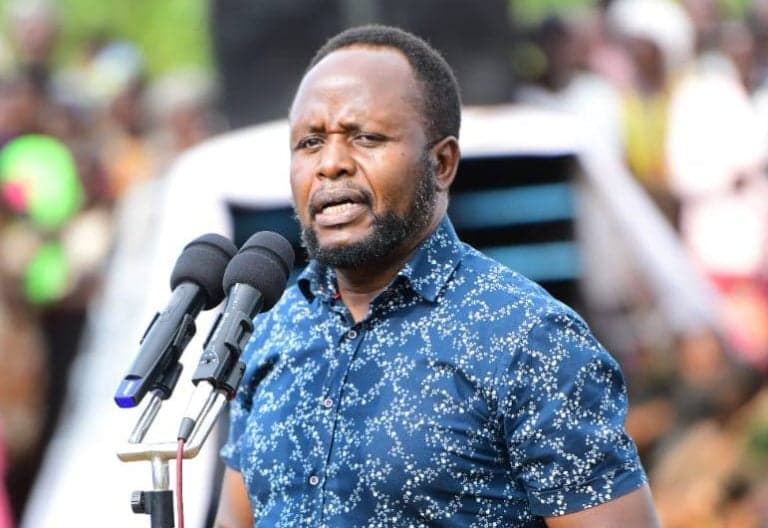We're loading the full news article for you. This includes the article content, images, author information, and related articles.
Nairobi, Kenya – George Natembeya promised to identify alleged government-backed presidential “projects.”

Nairobi, Kenya — September 23, 2025, 22:00 EAT
Trans Nzoia Governor George Natembeya has pledged that the opposition will soon publicly name those he claims are being secretly sponsored by President William Ruto as “presidential projects”—that is, individuals covertly supported by the government in the 2027 race. He said such revelations will show who is truly aligned with the administration and who is working as “projects for Kenyans.”
Speaking on local television, Natembeya said:
“Tutatangaza wagombea ambao watakuwa projects kwa Wakenya. Ukweli wa mambo ni kwamba, ikifika 2027, kutakuwa na upande wa serikali na opposition.”
He warned that candidates who align quietly with the government, or who are being “held at ransom,” will be exposed.
Natembeya’s remarks come amid speculation that figures within opposition circles may be covertly supported or coopted by the ruling side. He compared this to historical divisions in opposition that weakened their ability to challenge incumbents.
He also referenced past claims by former Deputy President Rigathi Gachagua that Ruto might back a candidate from Murang’a, framing Natembeya’s vow as part of that broader debate on influence and sponsorship.
In Kenya’s political parlance, a “project” candidate is often understood to be someone backed by state resources, patronage, or hidden support rather than by grassroots momentum or party structures.
Across elections, both ruling and opposition sides have accused each other of “planting” candidates to split votes, sabotage rivals, or shape outcomes.
Natembeya’s statement signals heightened sensitivity within opposition ranks about infiltration or internal defection ahead of 2027.
Political signaling: This is a strategic move to deter defection and reassure opposition supporters that their leaders will hold rogue actors to account.
Reputational risk: If Natembeya names individuals, they may respond with court action or reputation defense — defamation risks loom.
Mobilisation effect: Exposing “projects” may strengthen loyalty among opposition base, but also risk deepening mistrust or fractures if allegations are not verified.
Coalition dynamics: In coalition politics, suspicions of “projects” could make alliance negotiations more delicate and trust weaker.
Governor Natembeya (Trans Nzoia): He positions himself as a guardian of opposition integrity and vows to call out hidden actors.
Opposition leadership and rank-and-file: Some may be nervous about being publicly accused, while others may welcome the clarity.
Government / ruling party: Likely to deny or dismiss the claims, and may counter-accuse the opposition of projection and political witch-hunting.
Independent observers / media: Will likely watch for how evidence is gathered, the standard of proof, and whether accusations stick.
|
Item |
Detail |
|---|---|
|
Speaker |
Governor George Natembeya, Trans Nzoia |
|
Declaration |
That opposition will “announce candidates who will be projects for Kenyans” |
|
Context of claim |
Suggestion that government is quietly backing or influencing some opposition figures |
Allegation fallout: If accusations turn out unsubstantiated, reputations of accuser and accused could suffer.
Internal mistrust: Opposition parties may start second-guessing each other, leading to infighting, especially as alliances are formed.
Defensive posture by government: The ruling side may counter with their own claims of opposition “spies,” creating a negative narrative war.
Voter disillusionment: If politics becomes dominated by claims of secret deals rather than policies, public faith in democratic process might erode.
Exactly who the targets will be and whether Natembeya has names and evidence prepared.
What criteria will be used to determine whether someone is a “project” candidate.
How soon the opposition will publicly reveal names, and what format (press conference, leaks, coalition statements).
The response from those accused, whether legal, political, or media counterattacks.
September 23, 2025: Governor Natembeya makes the vow to expose “Ruto-sponsored” candidates.
Before 2027: Window during which opposition may disclose suspect candidates, possibly timed before primaries or by-elections.
Whether Natembeya or allied groups name specific individuals and publish supporting evidence.
Reactions from opposition figures who may be accused—will they resign, deny, or sue?
How this plays into coalition negotiations and candidate selection ahead of 2027.
Media and civil society scrutiny on standards, proof, and fairness in accusations of “projects.”
Keep the conversation in one place—threads here stay linked to the story and in the forums.
Sign in to start a discussion
Start a conversation about this story and keep it linked here.
Other hot threads
E-sports and Gaming Community in Kenya
Active 9 months ago
The Role of Technology in Modern Agriculture (AgriTech)
Active 9 months ago
Popular Recreational Activities Across Counties
Active 9 months ago
Investing in Youth Sports Development Programs
Active 9 months ago
Key figures and persons of interest featured in this article